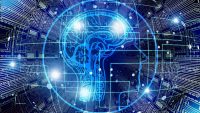Federal Judge Rules AI-Enabled Machines Are Not Inventors
September 8, 2021
U.S. District judge Leonie Brinkema just ruled that an artificial intelligence-enabled computer cannot be listed as an inventor on patents and that only humans can be inventors under U.S. law. That’s because, according to Federal law, an “individual” must take an oath that he/she is the inventor and the term “individual” is legally defined as a natural person. The ruling was in response to University of Surrey law professor Ryan Abbott’s effort, the Artificial Inventor Project, to get a computer listed as an inventor.
Bloomberg reports that, “Abbott’s team enlisted Imagination Engines founder Stephen Thaler to build a machine whose main purpose was to invent.” Thaler’s invention, the DABUS, dubbed a creativity machine, “invented” a beverage container and a “device for attracting enhanced attention.”

Abbot’s team “filed applications in 17 jurisdictions around the world listing DABUS as the inventor.” The U.S. Patent and Trademark Office rejected it for failing to list a person as the inventor, and “Thaler appealed to the district court.”
In response to Brinkema’s ruling, Abbott said that “we respectfully disagree with the judgment and plan to appeal it … we believe listing an AI as an inventor is consistent with both the language and purpose of the Patent Act.” Brinkema had cited “cases in which the U.S. Court of Appeals for the Federal Circuit, the nation’s top patent court, rejected the idea of a corporation being an inventor.”
The patent office “has gathered input from a range of companies and individuals on how to address AI both as an invention and potential inventor and is seeking comment on how patent eligibility affects investment.”
According to Kilpatrick Townsend & Stockton lawyer Kate Gaudry, the consensus was that AI “isn’t advanced to the point where it could be an inventor, and Congress gave no indication it even considered the issue when overhauling the patent system in 2011.” But Gaudry added that the law is ambiguous whether or not “individual” needs to be a human.
Gizmodo reports Brinkema noted that, “by using personal pronouns such as ‘himself or herself’ and the verb ‘believes’ in adjacent terms modifying ‘individual,’ Congress was clearly referencing a natural person.”
“Because ‘there is a presumption that a given term is used to mean the same thing throughout a statute,’ the term ‘individual’ is presumed to have a persistent meaning throughout the Patent Act,” she added, also rejecting “Thaler’s claim that the Patent Office had to provide evidence that Congress did not want to exclude AI systems from being inventors.”
Thaler argued that Congress’ inten[ded] to create a system that would “encourage innovation.” “Allowing patents for AI-Generated Inventions will result in more innovation,” he said. “It will incentivize the development of AI capable of producing patentable output by making that output more valuable… by contrast, denying patent protection for AI-Generated Inventions threatens to undermine the patent system by failing to encourage the production of socially valuable inventions.”

No Comments Yet
You can be the first to comment!
Sorry, comments for this entry are closed at this time.